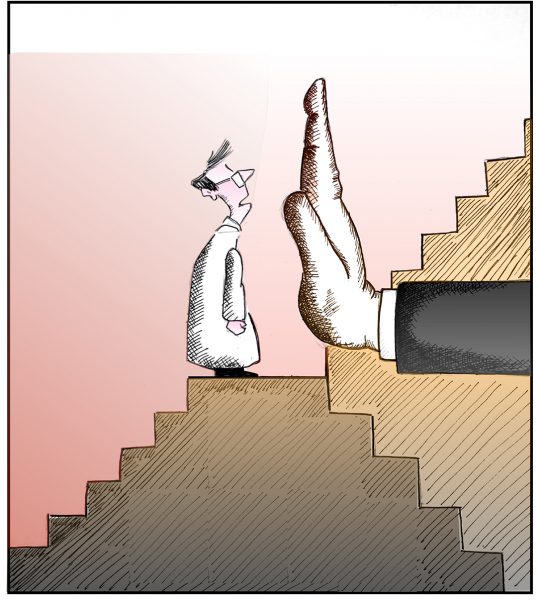Illustration by Morteza Mahmoudi
Feeling exhausted and helpless? Do you sometimes dread or fear going to work, knowing you have to deal with bad behaviors of a workplace bully? Do you ever feel stuck, unable to achieve your true potential because of the smothering effects of an unprofessional supervisor meant to uplift you and advance your knowledge? Are you unsure how to address your current situation, as a target of bullying? Well, you are not alone! Various studies have revealed that we have serious bullying issues right in our science backyard, and many “true” scientific leaders have written about this issue; for example, see the published pieces in Nature Chemistry and Nature Medicine.
Targets of bullying are often the most vulnerable members of the scientific workforce—they may be low-paid graduate students or postdocs, living in a foreign country, navigating a foreign language and culture, and whose immigration status is tied directly to their employment. They may also have young families, be living paycheck-to-paycheck, and have health insurance and other benefits that depend on a contract position that can be revoked with little to no notice or cause. The central problem is that targets of bullying on the low end of a power differential are not likely to be supported by their institutions, particularly institutions that rely on the big grant brought in by senior faculty members who may be the bullies themselves.
Based on my own experience as a target and hundreds of other target stories which I reviewed in the past few years through the complaints submitted to the Parity Movement Organization, I wrote a piece in Nature Human Behaviour on practical approaches that can equip targets of academic bullying with useful strategies and knowledge that can be employed to protect themselves and fight back against bad behaviors. After all, as said well by Barak Obama: “Change will not come if we wait for some other person or if we wait for some other time. We are the ones we’ve been waiting for.”
There are couple of additional items that I would like to share to help tackle workplace bullying in academia:
First, ensure to gain enough information of that lab that you intend to join. Try to get ethical information (such as what’s the PI’s expectation and their behavior toward lab members at both normal and heated situations). Try to get such information from the lab alumni rather than the current members, as the current employees may have some reservations.
Second, prior to joining the lab, perhaps in the interview process, talk with your future PI about their expectations and make sure that those fit with the proposed roles.
Third, the best time to respond against bullying behavior is the first time it happens. Try to meet with an ombudsperson of your institution/hospital and talk about the incident to make sure that what you are seeing/experiencing falls into the category of academic bullying and not academic freedom. Then, if such bullying behavior continues and you use the code of silence, you should expect elevation of bad behaviors. Instead of using the code of silence, you can easily follow the proposed piece of advice presented in Nature Human Behaviour to minimize the adverse effects of such behaviors on your health and career.
Finally, be cautious; just as can sometimes happen with cycles of other forms of abuse, so too can the bullied become the next bully in academia! The only way to avoid that fate is to heal the wounds inflicted upon you. There are many ways to this including: writing about the problem of academic bullying; sharing your experience with supporters (e.g., ombudsperson and psychologists); and being a proactive bystander to help other targets. Every piece of such actions would act like a healing bandage for you.
The unfortunate reality of our lives, as human beings, is that there is no chance to have a galley proof of our lives and make the corrections we desperately wish we would have done in the past! Therefore, one can expect to choose, at least, the good enough path in keeping a happy and healthy life. Our work and its environment occupy a considerable percentage of our lifespan and work-related issues can have significant effects on both our mental and physical health. The bad news is that the pressure/stress/anxiety that we experience in our working environment not only adversely affects our own life but also affects the people in our circle of influence, including our families. In addition, in clinical setting, such bad behaviours may increase the incidences of unintentional, but avoidable, errors in medical decisions which can significantly affect patients’ health.
As a human being, our average lifespan is only three billion heart beats; don’t lose the beats in the hostile environment. Protect yourself and your loved ones from regretting your inability to make changes to the galley proof of your life!

















